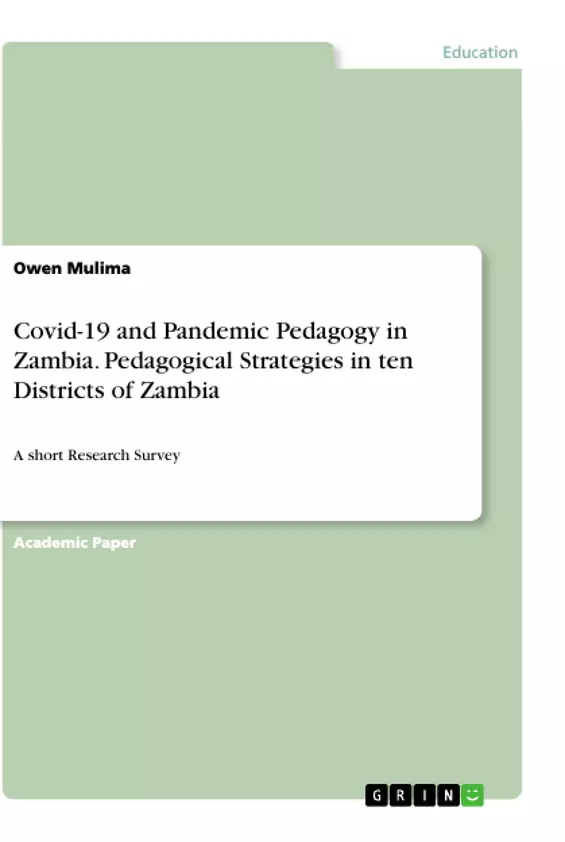The study tries to find out what strategies teachers and schools were implementing to meet the challenges of the Corona Virus pandemic. The results would serve as a sharing point of pedagogy strategies for many educators who would love to see the continuity of the teaching and learning process in the face of a pandemic. Interviews, testimonies, observations and participant observations were employed to obtain the results for this study.
The beginning of the year 2020 saw a lot of disruptions in many spheres such as the social, economic, religious and political spheres due to the global outbreak of the Corona Virus Disease. As such, teaching and learning in many education institutions was also disrupted. This paper presents pedagogical strategies employed by some teachers and schools in ten districts of Zambia to ensure continuity of teaching and learning amidst the pandemic. The districts included; Kabwe, Kapiri-Mposhi, Mpongwe, Mkushi, Kitwe, Kafue, Luanshya, Lusaka, Mazabuka and Monze.
Inhaltsverzeichnis (Table of Contents)
- Introduction
- Methodology
- Results and Discussion
- Conclusions and Recommendations
- REFERENCES
- RESPONDENTS
Zielsetzung und Themenschwerpunkte (Objectives and Key Themes)
This paper explores the pedagogical strategies implemented by teachers and schools in Zambia to ensure the continuity of education amidst the COVID-19 pandemic. The study investigates the challenges and opportunities presented by the sudden shift to remote learning in a developing country context.
- Impact of COVID-19 on education in Zambia
- Strategies for maintaining continuity of teaching and learning during a pandemic
- Challenges and opportunities of online learning in a developing country context
- Reflections on the experiences of teachers and learners during the pandemic
- Analysis of the effectiveness of various pedagogical approaches employed
Zusammenfassung der Kapitel (Chapter Summaries)
- Introduction: This chapter provides an overview of the COVID-19 pandemic and its impact on various spheres of society, particularly education. The chapter highlights the significance of the pandemic in reconfiguring pedagogical strategies and the need to explore innovative approaches to ensure learning continuity.
- Methodology: This chapter explains the research design and methodology employed in the study. It details the use of qualitative case study, sampling strategy, and data collection methods.
- Results and Discussion: This chapter presents the findings of the study, focusing on the pedagogical strategies employed by schools and teachers in ten districts of Zambia. The chapter discusses the challenges and successes of implementing these strategies, analyzing their impact on learners and educators.
Schlüsselwörter (Keywords)
This paper examines the impact of the COVID-19 pandemic on education in Zambia, exploring the strategies implemented by teachers and schools to ensure learning continuity. The research investigates the challenges and opportunities of online learning in a developing country context, focusing on the experiences of both teachers and learners. Key themes explored include: pedagogy, remote learning, ICT infrastructure, educational equity, and the impact of the pandemic on the educational landscape in Zambia.
Frequently Asked Questions
How did COVID-19 affect education in Zambia?
The pandemic disrupted social, economic, and political spheres, leading to the closure of schools and a sudden need for remote teaching and learning strategies.
Which Zambian districts were included in this study?
The research covered ten districts: Kabwe, Kapiri-Mposhi, Mpongwe, Mkushi, Kitwe, Kafue, Luanshya, Lusaka, Mazabuka, and Monze.
What pedagogical strategies were used during the pandemic?
Teachers and schools implemented various approaches, including online learning, remote assignments, and the use of ICT infrastructure where available.
What were the main challenges for online learning in Zambia?
Key challenges included limited ICT infrastructure, issues with educational equity, and the lack of preparation for a sudden shift to digital pedagogy.
What research methods were used to obtain results?
The study employed qualitative methods such as interviews, testimonies, observations, and participant observations to gather data from educators.
- Arbeit zitieren
- Owen Mulima (Autor:in), 2020, Covid-19 and Pandemic Pedagogy in Zambia. Pedagogical Strategies in ten Districts of Zambia, München, GRIN Verlag, https://www.grin.com/document/933604



